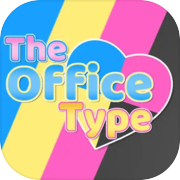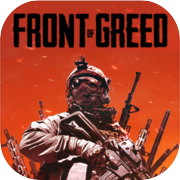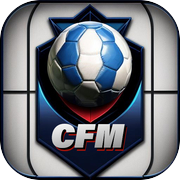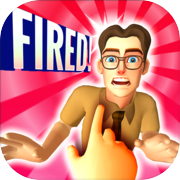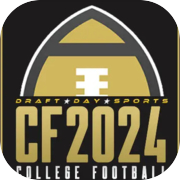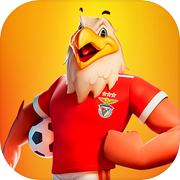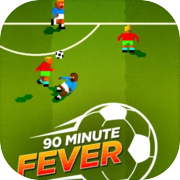Front Office Football Nine
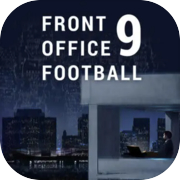
Put yourself in the front office with Front Office Football Nine.
Front Office Football is a text-based sports simulation. It's a game for those of us who love the numbers and strategies in sports.
In Front Office Football, you play the role of your favorite team's general manager. You determine your team's future through trading with opponents, negotiating contracts, bidding for free agents and discovering new talent through the annual amateur draft.
You can also play the role of the armchair coach, setting game plans, creating playbooks and depth charts. You can call every play yourself if you like.
You can determine ticket prices and submit stadium construction plans for public approval. You can move your team if the public won't properly support your franchise.
The original game, released in 1998, received an Editors' Choice award from Computer Gaming World and a 4 1/2-star review. It was nominated for numerous Sports Game of the Year awards. This is the Ninth full version of the game, released with rosters based on the 2023 season.Yearly Evaluation
In order to succeed in Front Office Football, you need to perform as well as possible in four different areas:
Team Performance. On the field, your primary goal is winning the coveted Front Office Bowl. Your fans, players and staff all want to see that championship banner raised to a new position in the ring of honor surrounding your stadium.
Financial Performance. Off the field, your team needs to show a profit, or the owner will become angry and threaten your job. You need to control salary and staff costs while balancing the need to spend money to build and upgrade your stadium against the risk of facing stagnant ticket revenue with an aging arena.
Roster Value. You need to negotiate contracts, sign free agents, make wise decisions in the amateur draft and outsmart opposing general managers in trade. Building a strong, capable roster means everything in Front Office Football.
Franchise Value. The bottom line is that a happy owner has a franchise that's the envy of professional football. Nothing means more to the owners than seeing their franchise on the top of the list of most valuable franchises. You help put your team on that list by excelling in the three other categories, but the best general managers look for opportunities to move the team in order to find a home town with a strong economy that will support your team like none other.Major Front Office Football Features
Front Office Football focuses on roster management and career play. You can play hundreds of seasons into a new universe, as long as you have the disk space. There are several key elements emphasized in the game design:
A realistic trading module. You can't simply take the players you want from other teams.
Proper aging of players. Players at different positions age differently. Quarterbacks need a couple of more years to reach their prime, but their careers last several years longer, on average, than running backs.
The amateur draft. Teams realistically assess their needs, and build through the draft.
Statistics. All the major stats are tracked and are available at any given time. Career and full season-by-season statistics are tracked in 190 different categories, including Red Zone and Third Down numbers. You can view and sort statistics by team, category and position. It's fast and accurate. Front Office Football also tracks and displays 143 different team statistics (both offense and defense) and league totals.
Play calling. Designed to allow quick selection of a large library of players, you can be the ultimate GM and wrest control of the play-by-play action from your coach. You can tailor your in-game strategy to your team's strengths without having to build each play from scratch.
Free agency. Teams compete with you to sign the best free agents. Each player has his own idea of how much he wants to stay with his existing team, and how much he wants to play for a champion. But money is still at the root of all decisions.
Offensive playbooks. Each season, you can create a playbook full of offensive plays your team will use during the season.
Depth charts. You can set every personnel grouping for your team, on offense and on defense. Front Office Football simulates games based on these charts.
Game plans. The game plan will allow you to specify different strategies depending on the score of the game and how much time remains. You can create scripts of plays to use based on down, distance and field position. On defense, you select plays based on the situation and what the offense is showing. You can micro-manage every decision, or you can leave everything to your coaching staff.
Player ratings. Each player is rated for 48 different skills. But you don't have access to the raw numbers. Where's the fun in that? You hire a coaching staff, with varied strengths and weaknesses. Your coaches tell you how good they think your players are - and how good they think your opponents' players are.
The salary cap. It's an essential tool in keeping parity among professional football rosters. You'll have to cut your aging, high-paid veterans just like any ruthless general manager worth his weight in negotiations.
Metropolitan Areas. Submit a plan to build a new stadium to your voters. If they turn you down, you can propose a move to any city within a major metropolitan area within the game.
Team Cohesion. Each position group unit on your team is evaluated for how long they've played together. This can enhance team performance, particularly for offensive linemen.
Record keeping. All team statistics are tracked for a manager's entire career. Team records, including all-time performance against every other team, are kept. A game-by-game performance breakdown is always available for individual players.
Record Book. The game tracks the top 100 individual performances in more than 40 statistical categories. Individual game records, season records, career records, playoff game records and career playoff records are tracked. A smaller set of records is kept for team performances.
Power ratings. You can see how your team ranks using Solecismic Software's custom power rankings. These ratings are used to set a point spread for each game.
Enhanced replay value. Every time you start a new career, the core ratings for each player are randomly affected. For veterans, the random change will be very small. Established stars will always be significant players. For rookies, however, performance will vary significantly. This allows for a more challenging game and greater replay value.What's New in Front Office Football Nine?
Front Office Football Nine was built on an entirely new code base, designed for simulation speed, growth and flexibility. The list of new features is extensive:
An intuitive interface, redesigned from the moment you enter a new career. The emphasis is on clear, quick navigation to the information you want to see.
Flexible league sizes and structures. Front Office Football Nine ships with 17 different league configurations, ranging from nine teams to 32. Each configuration has a designated schedule rotation ensuring teams play a fair schedule each season. Franchises can be based in default cities or randomly assigned when you start a new universe.
Calendar-based actions. Each year has a month/day calendar, with important dates highlighted. A Team Management screen is always available, with links and descriptions of everything you can do for your team on that day. You can simulate to any date on the calendar (up to 10,000 days at a time).
Play-Calling Interface. A brand new full-screen play-calling interface allows you to call your team's plays during a game, make substitutions, view updated individual and team statistics.
Historical Quarterbacks. With any league, you have the option of including a selection of starting quarterbacks from the past. These quarterbacks are rated in far more detail than in a player file.
The "Video" Podcast. Each week, the league puts together an overview of all the games played, highlighting the most important plays.
Comprehensive weather system. Every day, the weather is calculated for each of the metropolitan areas modeled in the game. Each metropolitan area has a climate. You can "see" storm fronts move across countries.
Foreign franchises. Front Office Football models 1,171 metropolitan areas in the United States, Canada and the United Kingdom. Cities in 322 of these areas can host franchises.
Compensation Picks. Each season, teams will receive compensatory draft picks for free agents they lost the previous year.
Team and League Overview screens. Among nearly 200 screens in Front Office Football Nine are the new Team Overview and League Overview screens, which act as front pages for your universe.
Fan Allegiance. Each franchise has a fan base, based on the television markets defined in major metropolitan areas. Teams can improve their following by winning games and championships. Teams with a bigger fan base have a more valuable brand and earn more money each season.
Expanded Almanac. The Almanac contains leaderboards, award lists, sections for each franchise and for each season. It's a comprehensive and greatly expanded history of your universe.
Player Index. A searchable record of every player who has been drafted and/or has played in a game in your universe.
Milestones. A list of the greatest individual performances, plus season and career thresholds, tracked by date.
Game Books. An all-inclusive record of each game played during your universe, including a Game Flow that constantly tracks the likelihood a team wins a game and marks the most important plays of the game.
Game Recaps. For any game played in your universe, you can enter the recap and see all the play diagrams and updated statistics.
Modern New Statistics. For quarterbacks and receivers, the game tracks air yards and yards after catch. Learn who is really testing the defense. See how quarterbacks fare against the blitz. Learn which running backs have the highest percentage of successful runs.
Player Finances. Learn which players have the highest career earnings and sell the most jerseys. Players who are both stars on the field and popular with the fans sell more jerseys, which means more team revenue.
Injury Models. Players are rated for and can develop increase susceptibility to injuries in several areas of the body.
Revamped Chemistry. Chemistry is now defined only between quarterbacks and wide receivers. It's possible your new free agent star wideout simply doesn't work well with your quarterback.
Fifth-Year Contracts. Three years after the amateur draft, you'll have the opportunity to extend the contracts of players you drafted in the first round for a guaranteed fifth year.
New Defensive Play-Calling System. A more intuitive and expansive defensive play system based on setting up one of 16 pass coverages along with double-team, spy, blitzing choices.
Those are only the highlights of all the new features in Front Office Football Nine. Thanks for considering the game.
Front Office Football is a text-based sports simulation. It's a game for those of us who love the numbers and strategies in sports.
In Front Office Football, you play the role of your favorite team's general manager. You determine your team's future through trading with opponents, negotiating contracts, bidding for free agents and discovering new talent through the annual amateur draft.
You can also play the role of the armchair coach, setting game plans, creating playbooks and depth charts. You can call every play yourself if you like.
You can determine ticket prices and submit stadium construction plans for public approval. You can move your team if the public won't properly support your franchise.
The original game, released in 1998, received an Editors' Choice award from Computer Gaming World and a 4 1/2-star review. It was nominated for numerous Sports Game of the Year awards. This is the Ninth full version of the game, released with rosters based on the 2023 season.Yearly Evaluation
In order to succeed in Front Office Football, you need to perform as well as possible in four different areas:
Team Performance. On the field, your primary goal is winning the coveted Front Office Bowl. Your fans, players and staff all want to see that championship banner raised to a new position in the ring of honor surrounding your stadium.
Financial Performance. Off the field, your team needs to show a profit, or the owner will become angry and threaten your job. You need to control salary and staff costs while balancing the need to spend money to build and upgrade your stadium against the risk of facing stagnant ticket revenue with an aging arena.
Roster Value. You need to negotiate contracts, sign free agents, make wise decisions in the amateur draft and outsmart opposing general managers in trade. Building a strong, capable roster means everything in Front Office Football.
Franchise Value. The bottom line is that a happy owner has a franchise that's the envy of professional football. Nothing means more to the owners than seeing their franchise on the top of the list of most valuable franchises. You help put your team on that list by excelling in the three other categories, but the best general managers look for opportunities to move the team in order to find a home town with a strong economy that will support your team like none other.Major Front Office Football Features
Front Office Football focuses on roster management and career play. You can play hundreds of seasons into a new universe, as long as you have the disk space. There are several key elements emphasized in the game design:
A realistic trading module. You can't simply take the players you want from other teams.
Proper aging of players. Players at different positions age differently. Quarterbacks need a couple of more years to reach their prime, but their careers last several years longer, on average, than running backs.
The amateur draft. Teams realistically assess their needs, and build through the draft.
Statistics. All the major stats are tracked and are available at any given time. Career and full season-by-season statistics are tracked in 190 different categories, including Red Zone and Third Down numbers. You can view and sort statistics by team, category and position. It's fast and accurate. Front Office Football also tracks and displays 143 different team statistics (both offense and defense) and league totals.
Play calling. Designed to allow quick selection of a large library of players, you can be the ultimate GM and wrest control of the play-by-play action from your coach. You can tailor your in-game strategy to your team's strengths without having to build each play from scratch.
Free agency. Teams compete with you to sign the best free agents. Each player has his own idea of how much he wants to stay with his existing team, and how much he wants to play for a champion. But money is still at the root of all decisions.
Offensive playbooks. Each season, you can create a playbook full of offensive plays your team will use during the season.
Depth charts. You can set every personnel grouping for your team, on offense and on defense. Front Office Football simulates games based on these charts.
Game plans. The game plan will allow you to specify different strategies depending on the score of the game and how much time remains. You can create scripts of plays to use based on down, distance and field position. On defense, you select plays based on the situation and what the offense is showing. You can micro-manage every decision, or you can leave everything to your coaching staff.
Player ratings. Each player is rated for 48 different skills. But you don't have access to the raw numbers. Where's the fun in that? You hire a coaching staff, with varied strengths and weaknesses. Your coaches tell you how good they think your players are - and how good they think your opponents' players are.
The salary cap. It's an essential tool in keeping parity among professional football rosters. You'll have to cut your aging, high-paid veterans just like any ruthless general manager worth his weight in negotiations.
Metropolitan Areas. Submit a plan to build a new stadium to your voters. If they turn you down, you can propose a move to any city within a major metropolitan area within the game.
Team Cohesion. Each position group unit on your team is evaluated for how long they've played together. This can enhance team performance, particularly for offensive linemen.
Record keeping. All team statistics are tracked for a manager's entire career. Team records, including all-time performance against every other team, are kept. A game-by-game performance breakdown is always available for individual players.
Record Book. The game tracks the top 100 individual performances in more than 40 statistical categories. Individual game records, season records, career records, playoff game records and career playoff records are tracked. A smaller set of records is kept for team performances.
Power ratings. You can see how your team ranks using Solecismic Software's custom power rankings. These ratings are used to set a point spread for each game.
Enhanced replay value. Every time you start a new career, the core ratings for each player are randomly affected. For veterans, the random change will be very small. Established stars will always be significant players. For rookies, however, performance will vary significantly. This allows for a more challenging game and greater replay value.What's New in Front Office Football Nine?
Front Office Football Nine was built on an entirely new code base, designed for simulation speed, growth and flexibility. The list of new features is extensive:
An intuitive interface, redesigned from the moment you enter a new career. The emphasis is on clear, quick navigation to the information you want to see.
Flexible league sizes and structures. Front Office Football Nine ships with 17 different league configurations, ranging from nine teams to 32. Each configuration has a designated schedule rotation ensuring teams play a fair schedule each season. Franchises can be based in default cities or randomly assigned when you start a new universe.
Calendar-based actions. Each year has a month/day calendar, with important dates highlighted. A Team Management screen is always available, with links and descriptions of everything you can do for your team on that day. You can simulate to any date on the calendar (up to 10,000 days at a time).
Play-Calling Interface. A brand new full-screen play-calling interface allows you to call your team's plays during a game, make substitutions, view updated individual and team statistics.
Historical Quarterbacks. With any league, you have the option of including a selection of starting quarterbacks from the past. These quarterbacks are rated in far more detail than in a player file.
The "Video" Podcast. Each week, the league puts together an overview of all the games played, highlighting the most important plays.
Comprehensive weather system. Every day, the weather is calculated for each of the metropolitan areas modeled in the game. Each metropolitan area has a climate. You can "see" storm fronts move across countries.
Foreign franchises. Front Office Football models 1,171 metropolitan areas in the United States, Canada and the United Kingdom. Cities in 322 of these areas can host franchises.
Compensation Picks. Each season, teams will receive compensatory draft picks for free agents they lost the previous year.
Team and League Overview screens. Among nearly 200 screens in Front Office Football Nine are the new Team Overview and League Overview screens, which act as front pages for your universe.
Fan Allegiance. Each franchise has a fan base, based on the television markets defined in major metropolitan areas. Teams can improve their following by winning games and championships. Teams with a bigger fan base have a more valuable brand and earn more money each season.
Expanded Almanac. The Almanac contains leaderboards, award lists, sections for each franchise and for each season. It's a comprehensive and greatly expanded history of your universe.
Player Index. A searchable record of every player who has been drafted and/or has played in a game in your universe.
Milestones. A list of the greatest individual performances, plus season and career thresholds, tracked by date.
Game Books. An all-inclusive record of each game played during your universe, including a Game Flow that constantly tracks the likelihood a team wins a game and marks the most important plays of the game.
Game Recaps. For any game played in your universe, you can enter the recap and see all the play diagrams and updated statistics.
Modern New Statistics. For quarterbacks and receivers, the game tracks air yards and yards after catch. Learn who is really testing the defense. See how quarterbacks fare against the blitz. Learn which running backs have the highest percentage of successful runs.
Player Finances. Learn which players have the highest career earnings and sell the most jerseys. Players who are both stars on the field and popular with the fans sell more jerseys, which means more team revenue.
Injury Models. Players are rated for and can develop increase susceptibility to injuries in several areas of the body.
Revamped Chemistry. Chemistry is now defined only between quarterbacks and wide receivers. It's possible your new free agent star wideout simply doesn't work well with your quarterback.
Fifth-Year Contracts. Three years after the amateur draft, you'll have the opportunity to extend the contracts of players you drafted in the first round for a guaranteed fifth year.
New Defensive Play-Calling System. A more intuitive and expansive defensive play system based on setting up one of 16 pass coverages along with double-team, spy, blitzing choices.
Those are only the highlights of all the new features in Front Office Football Nine. Thanks for considering the game.
Available on devices:
- Windows




